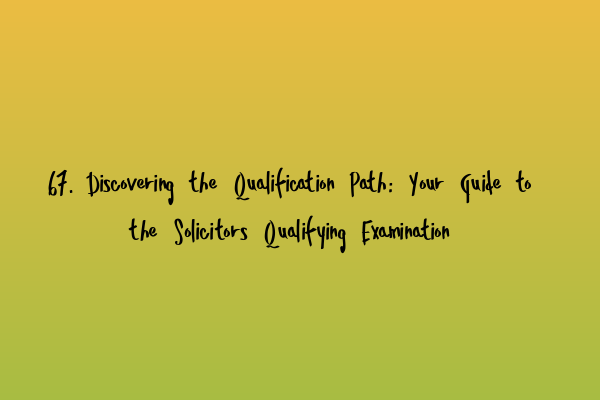67. Discovering the Qualification Path: Your Guide to the Solicitors Qualifying Examination
Are you ready to take the next step in your legal career? The Solicitors Qualifying Examination (SQE) is the new pathway to becoming a solicitor in England and Wales. Whether you are a law graduate or a qualified lawyer from a different jurisdiction, the SQE is designed to assess your knowledge and skills to ensure you are fully prepared to practice law in the UK.
In this comprehensive guide, we will explore the SQE in detail and provide you with all the information you need to navigate this qualification path successfully. From the eligibility requirements to the examination structure, we’ve got you covered.
Understanding the SQE
The Solicitors Qualifying Examination is a two-part assessment that will replace the current Qualified Lawyers Transfer Scheme (QLTS) and the Graduate Diploma in Law (GDL) for aspiring solicitors. The Solicitors Regulation Authority (SRA) introduced the SQE to ensure consistent standards of competence among solicitors and increase access to the legal profession.
Part 1: The first part of the SQE focuses on testing your functioning legal knowledge. It consists of two multiple-choice assessments, each with 180 questions. The questions will cover various areas of law, including criminal law, contract law, and property law, among others. The Part 1 assessment is designed to assess your understanding of key legal principles and your ability to apply them to practical scenarios.
Part 2: The second part of the SQE is a skills assessment that evaluates your ability to apply legal knowledge and skills to real-life situations. It consists of a series of practical legal tasks, such as drafting legal documents, conducting legal research, and advising clients. The Part 2 assessment is designed to assess your competence in legal practice and your ability to meet the expected standards of a solicitor.
Eligibility Requirements
In order to be eligible to take the SQE, you must meet certain requirements set by the SRA. Here are the key eligibility criteria:
- Academic Stage: You must hold a degree in any subject or an equivalent qualification.
- Character and Suitability: You must be deemed suitable to become a solicitor, taking into account factors such as criminal convictions, bankruptcy, and disciplinary actions.
- English and Welsh Language Skills: You must demonstrate a sufficient command of the English and Welsh language, both spoken and written.
If you meet these eligibility requirements, you can proceed to the next steps of the SQE qualification path.
Preparing for the SQE
Preparing for the SQE requires a systematic and focused approach. Here are some tips to ensure you are well-prepared for the examination:
- Develop a Study Plan: Create a study plan that outlines the topics you need to cover and allocate specific time for each subject. This will help you stay organized and make efficient use of your study time.
- Utilize Available Resources: Take advantage of the various resources available, such as textbooks, practice questions, and online study materials. Familiarize yourself with the SQE syllabus and focus on areas where you need the most improvement.
- Mock Examinations: Practice makes perfect! Take advantage of mock examinations to simulate the exam environment and gain confidence in your abilities.
- Seek Professional Guidance: Consider enrolling in a preparatory course or seeking guidance from experienced professionals. They can provide valuable insights and help you identify areas for improvement.
Remember, proper preparation is key to success in the SQE. Take the time to develop a study plan that works for you and dedicate sufficient time and effort to your preparation.
Next Steps: After Passing the SQE
Congratulations! You have successfully completed the SQE and are one step closer to becoming a solicitor. However, passing the SQE is not the final step in your qualification journey. Here are the next steps you need to take:
- Qualifying Work Experience: In addition to passing the SQE, you must also complete a minimum of two years of qualifying work experience (QWE) to be admitted as a solicitor. QWE involves working in a legal environment under the supervision of a qualified solicitor.
- Admission Process: Once you have completed the required QWE, you must apply for admission as a solicitor. This involves submitting an application to the SRA, providing necessary documentation, and paying the relevant fees.
Upon successful admission, you will be officially recognized as a qualified solicitor and can start practicing law in England and Wales.
Conclusion
The Solicitors Qualifying Examination is an exciting new pathway to becoming a solicitor. By understanding the structure of the examination, meeting the eligibility requirements, and preparing diligently, you can increase your chances of success.
If you are interested in exploring other aspects of UK law, check out these related articles:
- Unraveling the Complexities of UK Bail Laws
- Remand in Custody: Understanding Detention Prior to Trial
- Appeals in Criminal Law: A Roadmap to Seeking Justice
- Understanding Sentencing Guidelines in UK Criminal Cases
- Unveiling Drug-Related Offences: Laws and Consequences
Remember, the SQE is a challenging but rewarding journey. Stay focused, stay motivated, and you’ll be well on your way to achieving your goal of becoming a solicitor in England and Wales.
